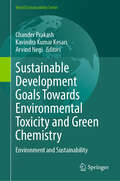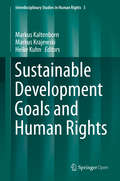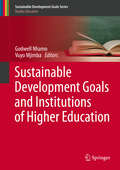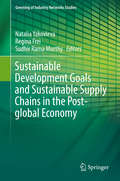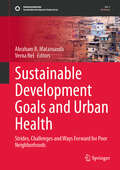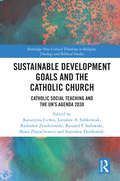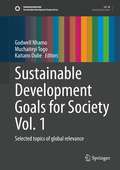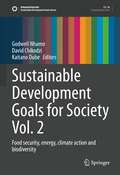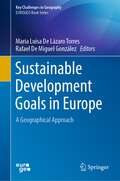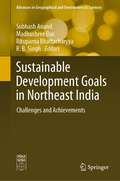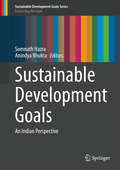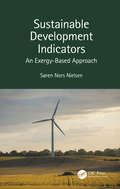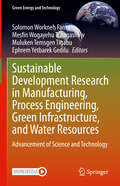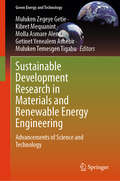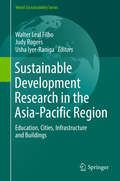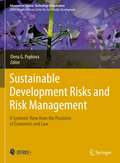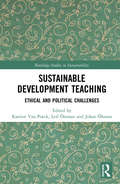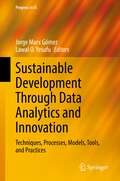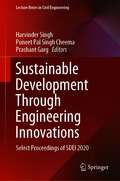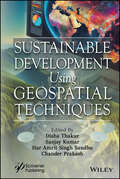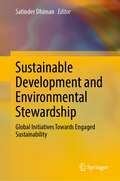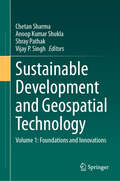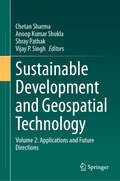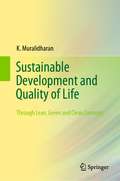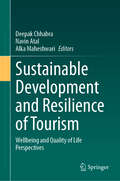- Table View
- List View
Sustainable Development Goals Towards Environmental Toxicity and Green Chemistry: Environment and Sustainability (World Sustainability Series)
by Kavindra Kumar Kesari Chander Prakash Arvind NegiThis book thoroughly explores strategies and greener methods, chemical and biological treatments, sustainable chemistry, and technological advancements aimed at mitigating the harmful effects of chemicals on the environment. Modern societies are often exposed to various types of chemicals, originating from natural or man-made sources. These chemicals can cause environmental damage, and their long-term exposure has been found to contribute to deteriorating public health. The increasing global human population has led to higher demand for everyday materials, resulting in unprecedented industrial production levels. This growth also jeopardizes the value-added supply chains of essential chemical industries such as pharmaceuticals, fertilizers, biologics, biotech. Consequently, there is a greater need for the use of sustainable and environmentally friendly methods. For example, in recent years, strategies have been developed to efficiently handle agricultural waste to produce materials, fuel, fine chemicals, and energy.
Sustainable Development Goals and Human Rights (Interdisciplinary Studies in Human Rights #5)
by Markus Krajewski Markus Kaltenborn Heike KuhnThis open access book analyses the interplay of sustainable development and human rights from different perspectives including fight against poverty, health, gender equality, working conditions, climate change and the role of private actors. Each aspect is addressed from a more human rights-focused angle and a development-policy angle. This allows comparisons between the different approaches but also seeks to close gaps which would remain if only one perspective would be at the center of the discussions. Specifically, the book shows the strong connections between human rights and the objectives of the 2030 Agenda for Sustainable Development and the Sustainable Development Goals adopted by the United Nations in 2015. Already the preamble of this document explicitly states that “the 17 Sustainable Development Goals ... seek to realise the human rights of all”. Moreover, several goals and targets of the 2030 Agenda correspond to already existing individual human rights obligations. The contributions of this volume therefore also address how the implementation of human rights and SDGs can reinforce each other, but also point to critical shortcomings of the different approaches.
Sustainable Development Goals and Institutions of Higher Education (Sustainable Development Goals Series)
by Godwell Nhamo Vuyo MjimbaThis volume brings together both theoretical and case study based contributions to the implementation of the Sustainable Development Goals (SDGs) in Institutions of Higher Education (IHE), presenting an impactful combination of authors from both developing and developed countries. While most current publications addressing the SDGs and education focus on sustainable development in general and specific topics such as climate change or energy, this book attempts to accelerate the localisation of the SDGs by presenting opportunities and innovations offered in various universities and campuses regarding SDGs localisation. The book seeks to provide an important contribution to the global dialogue on IHE and the SDGs, and will be of interest to academics and researchers engaged in the SDGs and education, as well as government agencies and other interested stakeholders. The book focuses on curriculum and learning matters, research and development as well as community engagement. Case studies detail the integration of SDGs in academic and professional development, new approaches to implementing sustainability science instruction, improvements in teaching practices to enhance teacher competence, and responsible management education. Additional focus is placed on the alignment of the SDGs in higher education with the other goals, emphasizing technological innovation for improved human health and environmental management, and climate change policies and action plans. Interdisciplinary solutions for pressing environmental problems are also provided, making sure that no one is left behind in realising these global development goals.
Sustainable Development Goals and Sustainable Supply Chains in the Post-global Economy (Greening of Industry Networks Studies #7)
by Natalia Yakovleva Regina Frei Sudhir Rama MurthyThis book presents a collection of studies on current best practices for delivering sustainable development policies within supply chains. It critiques the limitations of existing business theory and practice on sustainable supply chain management, and discusses opportunities for new conceptual models for businesses to engage with Sustainable Development Goals (SDGs). It examines how businesses can work towards implementing Sustainable Development Goals in the contexts of entrepreneurial initiative, industry collaboration and regional development. SDGs renew the sustainable development agenda for global communities and ask businesses and organisations to reset their sustainable development policies. A strategy to embed sustainable development principles into business operations along the supply chain operations, which has been a conceptual and, in many instances, practitioner, business and industry achievement of the past decades, is not enough to shift the economic and social conditions of poor populations around the world. How would the global supply chains of the future look like? What social relations does it envisage? How will businesses and organisations engage with societies, environments and complex institutional contexts in emerging markets and developing countries, which are faced with issues of population growth, needed leaps in infrastructure provision, educational and health improvements, cultural and institutional shifts? The books challenges current approaches to sustainable supply chain practices guided by discussion on SDGs. It reviews implementation issues of existing sustainable development approaches, assesses the advancement of sustainable development strategies and examines the opportunities for global value chains to increase their positive social and environmental inputs in regions, communities and organisations. The book collects both conceptual and empirical studies set in a variety of business and organisational contexts, such as manufacturing, retail, procurement, cities and industrial parks. It contests the accepted axioms of sustainable practices in the global supply chains and proposes new models for organisations and production networks to engage with societies and address market and production effects on communities and institutions.
Sustainable Development Goals and Urban Health: Strides, Challenges and Way Forward for Poor Neighborhoods (Sustainable Development Goals Series)
by Abraham R. Matamanda Verna NelThe main aim of this book is to understand the interplay between the SDGs and urban health. This is a critical issue in cities, considering the complexity of health issues and how they transcend most SDGs. However, the SDGs are premised on a broad set of generalised indicators and targets. Simultaneously, local contexts differ; thus, a one-size-fits-all understanding of urban health problems is not helpful. Therefore, the SDGs require Health in All Policies (HiAP) – “an approach to public policy across sectors that systematically takes into account the health implications of decisions, seeks synergies and avoids harmful health impacts to improve population health and health equity” (Ramirez-Rubio et al. 2019). In applying the HiAP concept, this book adopts a case study approach and considers the poor neighborhoods of a South African city, specifically Bloemfontein, part of the Mangaung Metropolitan Municipality. Each chapter presented in the book considers a particular SDG and how that goal relates to urban health.
Sustainable Development Goals and the Catholic Church: Catholic Social Teaching and the UN’s Agenda 2030 (Routledge New Critical Thinking in Religion, Theology and Biblical Studies)
by Ski Katarzyna Cichos Stanis 322 Jaros 322 Aw A. Sobkowiak Ryszard F. Sadowski Beata Zbarachewicz Rados 322 Aw Zenderowski Aw Dzieko 324This book identifies both the consistencies and disparities between Catholic Social Teaching and the United Nation’s (UN) Sustainable Development Goals (SDGs). With Pope Francis’ Laudato si’ encyclical, Catholicism seems to be engaging more than ever with environmental and developmental concerns. However, there remains the question of how these theological statements will be put into practice. The ongoing involvement of the Catholic Church in social matters makes it a significant potential partner in issues around development. Therefore, with the use of the comparative method, this book brings together authors from multiple disciplines to assess how the political and legal aspects of each of the UN’s 17 SDGs are addressed by Catholic Social Teaching. Chapters answer the question of how the Catholic Church evaluates the concept of sustainable development as defined by the Agenda 2030 Goals, as well as assessing how and if it can contribute to shaping the contemporary concept of global development. Examining the potential level of cooperation between the international community and the Catholic Church in the implementation of the Agenda 2030 Goals, this volume will be of keen interest to scholars of Catholic Studies, Religious Studies and the Sociology of Religion, as well as Environmental Studies and Development Studies.
Sustainable Development Goals for Society Vol. 1: Selected topics of global relevance (Sustainable Development Goals Series)
by Godwell Nhamo Kaitano Dube Muchaiteyi TogoWritten by 43 authors from Africa, Europe and Latin America, this book presents 19 topics addressing poverty in the context of Sustainable Development Goals (SDGs), leadership in implementing SDGs, and SDGs in service delivery and local government. As the world has gone past five years of implementing the 2030 Agenda for Sustainable Development and the intertwined 17 SDGs, new opportunities in research continue to open up. Hence, documenting some of the initiatives put in place around the world regarding the implementation of the SDGs is one of the aims of this publication. With 10 years remaining, the book further enhances the desire to scale up SDGs implementation. The selection of case studies from the selected regions also provides a balance in terms of how the SDGs are being rolled out for economic growth, environmental stewardship and social protection. The ambition remains even with the challenge brought by the COVID-19 pandemic that preoccupied the whole of 2020; spilling over to 2021. There is no doubt that resources have been diverted, but the world must stay on the course to 2030 and beyond. Therefore, the book is relevant for several stakeholders including the academics, development partners, government officials and other individuals that are involved in making sure no one is left behind in the lead to 2030.
Sustainable Development Goals for Society Vol. 2: Food security, energy, climate action and biodiversity (Sustainable Development Goals Series)
by Godwell Nhamo Kaitano Dube David ChikodziThis book profiles various cases that are emerging in addressing global challenges in the context of SDGs for society in the era of climate change and covers case studies of projects being undertaken to tackle biodiversity, food security, climate change, energy and water security. The book is written by 37 authors, and will appeal to various stakeholders including academics working within the identified thematic areas, policy planners, development agencies, governments and United Nations agencies. The adoption of the Sustainable Development Goals (SDGs) in 2015 ushered a new era in the global development agenda as the world transitioned from the Millennium Development Goals (MDGs). The new era of SDGs that are all-inclusive, unlike the MDGs with the focus now being on ensuring human success that is predicated on environmental protection. The year 2020 marked five years post the adoption of the SDGs with increased calls for stock-taking of progress made amid strong calls for a decade of action to accelerate the delivery of the SDGs by 2030. These calls have been louder now given the impact of the COVID-19 pandemic, which reset the global economy and increased intensity of extreme weather events across the world. Since climate change has emerged as one of the biggest threats to the achievement of the SDGs, there has been growing concerns on its impact on biodiversity loss and the extinction of some species. There are also concerns regarding increased food insecurity at the household level in some parts of the world, particularly in Asia and Africa. With the demand for climate change action on the increase, there have also been growing calls for the big carbon emitters to drastically cut their emissions and invest in clean energy to save the planet by following development pathways making emissions stay under the 1.5°C increase in temperature.
Sustainable Development Goals in Europe: A Geographical Approach (Key Challenges in Geography)
by María Luisa De Lázaro Torres Rafael De Miguel GonzálezThe aim of this book is to provide a synthesis of the newest research in Geography concerning the Sustainable Development Goals (SDG’s). Although the world is strongly interconnected, the majority of the chapters in this volume focus on Europe or the work of European researchers. Each chapter of this book focusses on one of the 17 SDG’s providing in-depth knowledge from a geographical perspective, fostering comprehensive research on these global targets to end poverty, fight inequality and injustice, and tackle climate change.The Sustainable Development Goals are part of the 2030 Agenda for Sustainable Development. To achieve them, it will be necessary for all stakeholders, including citizens (civil society, doctors, teachers), governments, private sector to collaborate.
Sustainable Development Goals in Northeast India: Challenges and Achievements (Advances in Geographical and Environmental Sciences)
by R. B. Singh Subhash Anand Rituparna Bhattacharyya Madhushree DasThis book covers themes related to the geosphere, biosphere, sociosphere and ecosphere dealing with changing geographical, environmental and socio-economic realities to plan a sustainable future for the northeast region (NER) of India. The NER consists of eight states—Assam, Arunachal Pradesh, Tripura, Nagaland, Manipur, Mizoram, Meghalaya and Sikkim—and they carry political, economic and social importance. The book integrates the past, present and future of geospheric attributes incorporating progress towards the Sustainable Development Goals (SDGs) to meet the demands for improving human wellbeing under diverse and challenging socio-economic, political and environmental conditions. The key SDGs, as in food and agriculture, health, education, water, energy and other overarching goals of the region, have yet to incorporate providing sustainable jobs and promoting equality and inclusive development, although there have been a few studies in that regard.The challenges to achieve SDGs in the NER are formidable compared to the rest of India. The NER has put a great deal of effort into achieving the SDGs, mainly in poverty (SDG-1), good health (SDG-3), education (SDG-4), gender (SDG-5), decent work (SDG-8) and reduced inequalities (SDG-10), similar to the rest of the country. However, the standard development indicators such as road length, access to health care, power consumption and other measures are far below the national average. A multi-pronged strategy has played a pivotal role in the region, but development strategy to attain the SDGs 2030 must be more inclusive in empowering people with maximising self-governance, considering the resources, needs and aspirations of the people.This book evaluates the performance of the SDGs and fills in the gaps. It includes case studies focusing on different SDGs using advanced cartographic, statistical and GIS techniques and methods. It also provides unique findings that serve as valuable resources for planners and policy-makers so that a sustainable future in Northeast India can be achieved.
Sustainable Development Goals: An Indian Perspective (Sustainable Development Goals Series)
by Somnath Hazra Anindya BhuktaThis volume examines the practicality of achieving the UN Sustainable Development Goals in India, and includes policy analyses and statistical assessments of comparative data between India and different countries. With a focus on poverty and economics, the contributors offer sector and state specific performance analyses of each goal, determining the feasibility for different states and regions to implement a given goal under conditions of extreme poverty and economic distress. Readers will learn how to perform comprehensive economic performance analyses, and how to apply these methods at local and regional scales within the framework of sustainable development. The book will be of interest to students and researchers studying sustainable development, economics, and policy analysis, as well as NGOs and government agencies working towards achieving the SDGs in impoverished nations.
Sustainable Development Indicators: An Exergy-Based Approach (Applied Ecology and Environmental Management)
by Søren Nors NielsenAnalyzing the self-sufficient Danish island of Samsø, this book explains sustainability through a bio-geophysical understanding of how to best use society’s limited resources to achieve true sustainability. The method used derives from the thermodynamic function of exergy. By analyzing exergy flows and establishing a system for evaluating the energy and the materials used in a society, the author creates a platform for monitoring certain indicators of sustainability. These indicators inform readers about the actions that must be taken and the time frames for achieving sustainability goals. The exergy-based approach is an important tool for carrying out such an analysis because it Focuses on several key thermodynamic concepts and the usefulness of exergy analysis for evaluating sustainability Explains sustainability by implementing thermodynamic laws to societal consumption and the use of resources Discusses new methods that integrate energy and material fluxes and evaluates them against each other Provides direct indicators for finding the largest problems/obstacles and deciding where measures should be taken Includes instructions on how to establish an accounting system for evaluating the energy and the materials used in a society This book is aimed for professionals, researchers, and students working on nature conservation and environmental management projects related to sustainability.
Sustainable Development Research in Manufacturing, Process Engineering, Green Infrastructure, and Water Resources: Advancement of Science and Technology (Green Energy and Technology)
by Solomon Workneh Fanta Ephrem Yetbarek Gedilu Mesfin Wogayehu Tenagashaw Muluken Temsgen TigabuThis book presents current research, recent advances, and emerging technologies on sustainable development issues in manufacturing, industrial processing, green infrastructure, and water resource engineering. Topics covered include sustainable energy, biomass, waste disposal, food processing and preservation, engineering properties, biopesticides, and surface water quality assessment. The book provides researchers, engineers, industry professionals, graduate students, and practitioners with state-of-the-art research on sustainability in developing countries.
Sustainable Development Research in Materials and Renewable Energy Engineering: Advancements of Science and Technology (Green Energy and Technology)
by Kibret Mequanint Muluken Zegeye Getie Molla Asmare Alemu Getinet Yenealem Ashebir Muluken Temesgen TigabuThis book presents current research, recent advances, and emerging technologies on sustainable development issues, engineering materials, and energy technology advancements, particularly in developing countries. It covers various methods, including numerical and experiment analysis. The coverage of materials includes advancements in construction materials and materials processing; biodegradable and bio-inspired materials; functional materials and their behavior; thermal and strength analysis of different materials, materials for energy storage, conversion, and transmission; composites and fibers. Studies on renewable and green energy systems and sources include energy storage; energy-saving technology; energy-efficient technologies; green energy systems; waste heat recovery; energy conversion systems; energy policies economics, and emerging technologies related to energy transformation. The state-of-the-art solar application areas covered include solar thermal systems, solar PV investigations, and solar applications for drying, cooling, and solar collectors. The book provides researchers, engineers, industry professionals, graduate students, and practitioners with state-of-the-art research on engineering materials, material science, sustainable energy engineering, and energy technology in developing economies.
Sustainable Development Research in the Asia-Pacific Region (World Sustainability Series)
by Walter Leal Filho Judy Rogers Usha Iyer-RanigaThis multidisciplinary book focuses on best practices in sustainability research in the Asia-Pacific Region. Drawing links between research, practice, education for sustainability and the needs of industry, it addresses the sustainable development goals (SDGs).The book also presents research undertaken by a wide range of universities on matters related to sustainable development, in order to promote research in this area across multiple disciplines. Four key themes are explored: (1) Education for Sustainability. (2) Sustainable Cities. (3) Sustainable Buildings. (4) Sustainable Infrastructure.This unique book documents and disseminates the wealth of know-how on sustainable development research in the Asia-Pacific Region today. It presents lessons learned and comparative case studies from various countries, including India, China, Indonesia, the Philippines, Bangladesh, New Zealand and Australia.
Sustainable Development Risks and Risk Management: A Systemic View from the Positions of Economics and Law (Advances in Science, Technology & Innovation)
by Elena G. PopkovaThis book is devoted to a systemic study of socio-economic development risks arising in the Decade of Action, as well as the prospects for risk management in support of sustainable development. It aims to overcome fragmentary consideration of risks in the existing literature through their comprehensive coverage and the establishment of their interconnections from the perspective of sustainable development.The novelty of this book is that it provides a comprehensive accounting of socio-economic development risks in the Decade of Action, as well as a rethinking of these risks from a sustainable development perspective. The book also opens up the possibility of the most comprehensive and effective risk management in support of sustainable development. The practical relevance of the book stems from the fact that it describes and discusses practical experience in detail and accompanies the theoretical material with numerous case studies, including cases and frameworks with extensive coverage of international best practices.The book is intended for scholars, for whom the book forms a systemic scientific view of the risks of socio-economic development arising in the Decade of Action, as well as the prospects for risk management in support of sustainable development. The book is also of interest to practitioners, for whom it offers practical advice on risk management at all levels of the economy for sustainable development. Many examples from different countries make the book attractive to a wide international audience. The book is of particular interest to readers from Russia.
Sustainable Development Teaching: Ethical and Political Challenges (Routledge Studies in Sustainability)
by Leif Östman Katrien Van Poeck Johan ÖhmanThe aim of this book is to support and inspire teachers to contribute to much-needed processes of sustainable development and to develop teaching practices and professional identities that allow them to cope with the specificity of sustainability issues and, in particular, with the teaching challenges related to the ethical and political dimension of environmental and sustainability education. Bringing together recent scholarship on the topic, this book translates state-of-the-art academic research into teaching models, methods and tools. Starting with an outline of the challenge of sustainability, it offers insights and models for understanding the interesting yet ambiguous concept of ‘sustainable development’ and the complex process of transforming society in a more sustainable direction (Part I). It then goes on to provide a guide to preparing courses and lessons as well as tools for reflection about teaching practices and the multiplicity of approaches to addressing ethical and political challenges in sustainable development teaching (Part II). Finally, the book offers useful conceptual frameworks, models and typologies about the concrete design and implementation of sustainable development teaching (Part III). This book will be essential reading for students of education, as well as teachers in compulsory and higher education and sustainability education researchers.
Sustainable Development Through Data Analytics and Innovation: Techniques, Processes, Models, Tools, and Practices (Progress in IS)
by Jorge Marx Gómez Lawal O. YesufuSustainable development is based on the idea that societies should advance without compromising their future development requirements. This book explores how the application of data analytics and digital technologies can ensure that development changes are executed on the basis of factual data and information. It addresses how innovations that rely on digital technologies can support sustainable development across all sectors and all social, economic, and environmental aspects and help us achieve the Sustainable Development Goals (SDGs). The book also highlights techniques, processes, models, tools, and practices used to achieve sustainable development through data analysis. The various topics covered in this book are critically evaluated, not only theoretically, but also from an application perspective. It will be of interest to researchers and students, especially those in the fields of applied data analytics, business intelligence and knowledge management.
Sustainable Development Through Engineering Innovations: Select Proceedings of SDEI 2020 (Lecture Notes in Civil Engineering #113)
by Harvinder Singh Prashant Garg Puneet Pal Singh CheemaThis book comprises select peer-reviewed papers presented at the International Conference on Sustainable Development through Engineering Innovations (SDEI) 2020. It presents recent advances, new directions, and opportunities for sustainable and resilient approaches to design and protect the built-environment through engineering innovations & interventions. The topics covered are highly diverse and include all civil engineering and construction-related aspects such as construction and environmental Issues, durability and survivability under extreme conditions, design of new materials for sustainability, eco-efficient and ultra-high performance cementitious materials, embedded structural and foundation systems and environmental geomechanics. The book will be of potential interest to the researchers and students in the fields of civil engineering, architecture and sustainable development.
Sustainable Development Using Geospatial Techniques
by Sanjay Kumar Chander Prakash Disha Thakur Har Amrit Singh SandhuThis book is a must-have for anyone interested in leveraging geospatial technology, as it covers a wide range of applications and offers valuable insights into the mapping, visualization, and analysis of natural resource planning using GIS, remote sensing, and GPS. Geospatial technology (GT) is a combination of geographic information systems (GIS), remote sensing (RS), and the global position system (GPS) for the mapping, visualization, and analysis of natural resource planning. Nowadays, GIS is widely used throughout the globe for a wide range of applications. GIS is a system that combines locations, geography, hardware, software, statistics, planning, and digital mapping. GIS is a system in which one can store, manipulate, analyze, and visualize or display spatial data. The basic components of GIS are hardware, software, data, input, and manpower. One can develop spatial, temporal, and dynamic models using GIS, which may help in effective decision-making tools. Geospatial information is a computer programme that collects, stores, verifies, and presents information on locations on the surface of the Earth. Geographical information systems play a key role in sustainable development. Geospatial technology combines traditional database operations like query and statistical analysis with the specific graphical and geographic analytical capabilities offered by maps.
Sustainable Development and Environmental Stewardship: Global Initiatives Towards Engaged Sustainability
by Satinder DhimanThis book builds on recent advances in the theory of sustainable development and links it with environmental stewardship in a dialectical manner, as envisioned by global scholars in this emerging field. Environmental stewardship deals with practical issues of ecosystem management and governance to address changes in socio-ecological systems to sustain the supply and availability of ecosystem services by society. It means reducing our total footprint on the planet, not just carbon footprint. Truly global in scope, this volume is a humble offering of more than 12 scholars and practitioners from around the world to the exciting adventure of sustainable development and eco-stewardship. Featuring topics such as climate change, organizational sustainability, green innovation, and urban governance, this book is useful for policy makers, managers of NGOs, and sustainability researchers in developing engaging strategies for a more sustainable planet.
Sustainable Development and Geospatial Technology: Volume 1: Foundations and Innovations
by Vijay P. Singh Chetan Sharma Anoop Kumar Shukla Shray PathakThis two-volume set showcases the various ways in which geospatial technology can be used to achieve sustainable development goals across different sectors such as urban planning, natural resource management, agriculture, disaster management, and energy management. The books provide insights into the potential of geospatial technology in promoting sustainable development practices and addressing challenges related to climate change, environmental degradation, and socio-economic development. Both volumes together are a comprehensive guide that showcases the potential of geospatial technology in promoting sustainable development practices across different sectors, and will serve as an essential resource for professionals, policymakers, researchers, and students interested in sustainable development and geospatial technology. Volume 1 introduces the intertwined realms of sustainable development and geospatial technology. It navigates readers through the fundamental principles of sustainable development, exploring its goals and the pivotal role geospatial technology plays in its realization. Beginning with an overview of these critical concepts, it subsequently dives into the core foundations of geospatial technology, covering Geographic Information Systems (GIS), remote sensing, spatial data analysis, and data visualization. The volume also encompasses the practical aspects of sustainable urban planning, natural resource management, and transportation planning using GIS, underpinning the relevance of geospatial technology in addressing contemporary global challenges.
Sustainable Development and Geospatial Technology: Volume 2: Applications and Future Directions
by Vijay P. Singh Chetan Sharma Anoop Kumar Shukla Shray PathakThis two-volume set showcases the various ways in which geospatial technology can be used to achieve sustainable development goals across different sectors such as urban planning, natural resource management, agriculture, disaster management, and energy management. The books provide insights into the potential of geospatial technology in promoting sustainable development practices and addressing challenges related to climate change, environmental degradation, and socio-economic development. Both volumes together are a comprehensive guide that showcases the potential of geospatial technology in promoting sustainable development practices across different sectors, and will serve as an essential resource for professionals, policymakers, researchers, and students interested in sustainable development and geospatial technology.Volume 2 explores practical applications, insightful case studies, and emerging trends within the dynamic intersection of sustainable development and geospatial technology. Delving into the critical domain of water resources and agriculture, it scrutinizes the application of geospatial tools in river basin management, integrated water resources management (IWRM), sustainable agriculture, and precision agriculture. The volume then shifts its focus to disaster management, energy, and the future, encompassing geospatial data science for disaster resilience, Earth observation for sustainable energy management, and diverse case studies that highlight the impact of geospatial technology on sustainable development. Moreover, it ventures into environmental monitoring and analysis, discussing topics like land use planning, climate change mitigation, environmental monitoring technology, and socioeconomic inequalities.
Sustainable Development and Quality of Life: Through Lean, Green and Clean Concepts
by K. MuralidharanThis book aims at sensitizing readers towards sustainability and encourages them to understand the importance of lean, green and clean (LGC) issues pertaining to everyday life. The necessity of measurement-based evaluations, statistical significance of material use, and energy are discussed. The book focuses on the importance of climate change issues and environmental concerns associated with lean production and manufacturing. Emphasis is laid on understanding and applying the concepts of quality through project management and measurement based assessment methods. A wide range of audience, including students, teachers, quality professionals, management consultants, lean and Six Sigma practitioners, will find this book valuable.
Sustainable Development and Resilience of Tourism: Wellbeing and Quality of Life Perspectives
by Deepak Chhabra Navin Atal Alka MaheshwariThis volume examines progress in sustainable and resilient development of niche forms of tourism from a health and wellbeing perspective. It also aims to offer deep and innovative insights on the supporting role of non-pharmaceutical interventions to enhance resilience and wellbeing of visited and visiting communities. A comparative and critical discourse of the role of hard medicine is also offered, from both a core and supplementary perspective, particularly, from eudaimonic and physiologically restorative standpoints. Furthermore, indigenous non-pharmaceutical interventions and spiritual healing mechanisms are discussed in the context of their potential to facilitate long term immunity and happiness. The book conceptually situates health as a fourth pillar of sustainability, and examines its role in stimulating long-lasting transformations rooted in positive psychology, inner transformation and sustainable consumption of organic productsand services. It designs an evolving transformational ‘Quality of Life’ paradigm that strengthens the foundations of health/wellbeing-based sustainable development initiatives and resilience of tourism systems. The work will be of interest to academic, professional, and various public and private stakeholders of tourism such as destination marketing organizations, policy makers, hospitality industries, tour operators, host communities, NGOs, and government agencies.
